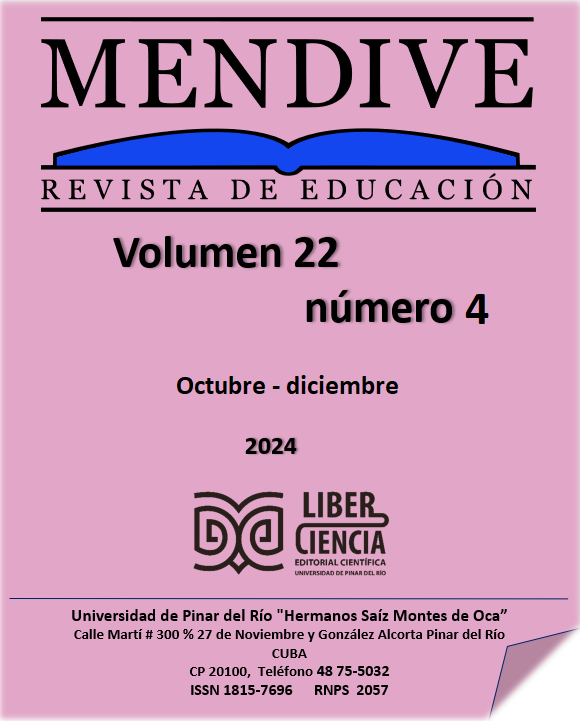The integral management of doctoral training at the Cuban university
Main Article Content
Abstract
The management of doctoral training in Cuban universities has been a complex process, which has gone through different management approaches. The Ministry of Higher Education, with the advisory body of the National Commission for Scientific Degrees, established the policy and legal and methodological regulations for managing doctoral training; however, the universities and research institutes have managed this process differently and the required quality standards were not always achieved, Therefore, this work aimed to establish the integral management of doctoral training at the Cuban university. The theoretical pillars were based on dimensions, sub-dimensions and indicators and on the dynamics of the management cycle of the theory of integral management of university processes. The principles of management of doctoral training and the contents of the dimensions and sub-dimensions of university management, with emphasis on pedagogy, were also established. As a general conclusion, the integral management of doctoral training at the Cuban university was based on theory and practice, contextualized to the current social, labor and economic conditions in Cuba. The work provides theoretical and methodological foundations for managing doctoral training at the Cuban university, which is a result of the research, development and innovation project with code PS223LH001-064, associated with the Higher Education and Sustainable Development sectoral program of the Ministry of Higher Education of Cuba.
Downloads
Article Details

This work is licensed under a Creative Commons Attribution-NonCommercial 4.0 International License.
References
Aguirre, J., Porta, L (2021). La formación doctoral desde coordenadas biográficas y profesionales. Revista Mexicana de Investigación Educativa, 26(91), 1035-1059. https://www.scielo.org.mx/pdf/rmie/v26n91/1405-6666-rmie-26-91-1035.pdf
Arias Rivera, M. L. (2020). La formación doctoral en gestión. Revista Atlante: Cuadernos de Educación y Desarrollo (febrero 2020), ISSN: 1989-4155. https://www.eumed.net/rev/atlante/2020/02/formacion-doctoral-gestion.html
Comisión Nacional de Grados Científicos. (2005). Normas y resoluciones vigentes para el desarrollo de los grados científicos en la República de Cuba. Ciudad de La Habana. https://instituciones.sld.cu/psiquiatricodelahabana/files/2018/02/normas grados_cngc2005.pdf
Díaz-Canel Bermúdez, M. (2022). Gestión de gobierno basada en ciencia e innovación: avances y desafíos. Anales de la academia de Ciencias de Cuba, 12(2). https://revistaccuba.sld.cu/index.php/revacc/article/view/e1235/1482
Gaceta Oficial de la República de Cuba (5 de septiembre de 2019). Decreto-Ley 372/2019 del Sistema Nacional de Grados Científicos. Ministerio de Justicia. Gaceta Oficial No. 65. https://www.uh.cu/wp-content/uploads/2022/11/GOC-2019-O65.pdf
Gutiérrez Baffil, T., Rivera Pérez, S. J., Robaina Pérez, R., Mijares Núñez, L. (2019). Gestión de los procesos universitarios en el Centro de idiomas de la Universidad de Pinar del Río. Revista Cubana de Educación Superior, 38(1) La Habana ene.-abr. 2019, versión On-line ISSN 0257-4314. http://scielo.sld.cu/scielo.php?script=sci_arttext&pid=S0257-43142019000100021
Mantal, L. & Marrone, M. (2022). Identifying skills, qualifications, and attributes expected to do a PhD. Studies in Higher Education, 47:11, 2273, DOI: 10.1080/03075079.2061444. https://www.researchgate.net/publication/359828542_Identifying_skills_qualifications_and_attributes_expected_to_do_a_PhD
Mendoza Otero, J., Rizo Rabelo, N., Beltrán Morales, E. R. (2021). La formación doctoral: estudio comparativo entre Europa y América. Revista Universidad y Sociedad, 13(4), 170-182.
Naciones Unidas. (2018). Agenda 2030 y los Objetivos de Desarrollo Sostenible: Una oportunidad para América Latina y el Caribe. https://repositorio.cepal.org/handle/11362/40155.4
Pérez Viñas, V. M., Ordaz Hernández, M., Pulido Díaz, A., González Pérez, M. M. (2024). PED-105. El proyecto de investigación como escenario fundamental en la gestión de la formación doctoral. Congreso Universidad 2024. Simposio 4. Formación de profesionales competentes desde una perspectiva inclusiva y equitativa, por un desarrollo sostenible. https://www.congresouniversidad.cu/event/xiv-taller-internacional-de-pedagogia-de-la-educacion-superior-ped-71/track/ped-105-el-proyecto-de-investigacion-como-escenario-fundamental-en-la-gestion-de-la-formacion-doctoral-4604
Pulido Díaz, A., Pérez Viñas, V. M., & Bravo Salvador, M. (2023). Una aproximación a la gestión de los procesos universitarios: sus dimensiones. Mendive. Revista de Educación, 21(1), e3012. https://mendive.upr.edu.cu/index.php/MendiveUPR/article/view/3012
Representación de la UNESCO en Perú. (2011). Manual de gestión para directores de instituciones educativas. Perú (Lima): Editora Lance Gráfico S.A.C. Libro digital: https://unesdoc.unesco.org/ark:/48223/pf0000219162
Rojas Murillo, A., García González, M. (2018). Gestión de la calidad de los procesos universitarios. Una mirada desde el proceso de formación de formadores para el desarrollo local. Revista de Estudios del Desarrollo Social, 6(2) La Habana may.-ago. 2018. http://scielo.sld.cu/scielo.php?script=sci_arttext&pid=S2308-01322018000200002
Rubio González, A, M., Hernández Pérez, G. D. (2018). La formación doctoral: pilar del desarrollo científico en la Universidad Central Marta Abreu de Las Villas. Revista Cubana de Educación Superior, 37 (3), 213-236, versión On-line ISSN 0257-4314. http://scielo.sld.cu/scielo.php?script=sci_arttext&pid=S0257-43142018000300013
Saborido Loidi, J. R. (2023). Universidad, investigación, innovación y formación doctoral para el desarrollo en Cuba. Revista Cubana de Educación Superior, 37(1 ene-abr) 4-18. https://revistas.uh.cu/rces/article/view/3138
Vargas Fernández, T., Ordaz Hernández, M., Marín Cuba, L. G., & González Pérez, M. M. (2023). Análisis del proceso de gestión de la formación doctoral en tres universidades cubanas. Mendive, 21(2), 3-19. https://mendive.upr.edu.cu/index.php/MendiveUPR/article/view/3271


